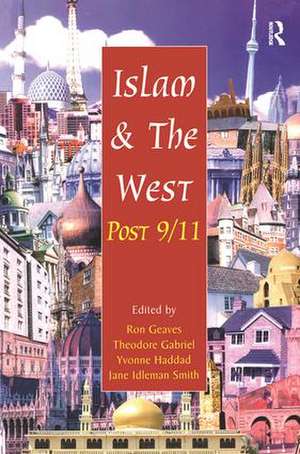Islam and the West Post 9/11
Autor Theodore Gabriel Editat de Ron Geaves Autor Jane Idleman Smithen Limba Engleză Hardback – 21 sep 2017
Preț: 1015.15 lei
Preț vechi: 1442.18 lei
-30% Nou
Puncte Express: 1523
Preț estimativ în valută:
194.27€ • 210.95$ • 163.19£
194.27€ • 210.95$ • 163.19£
Carte tipărită la comandă
Livrare economică 23 aprilie-07 mai
Preluare comenzi: 021 569.72.76
Specificații
ISBN-13: 9781138436763
ISBN-10: 1138436763
Pagini: 240
Dimensiuni: 156 x 234 mm
Greutate: 0.48 kg
Ediția:1
Editura: Taylor & Francis
Colecția Routledge
Locul publicării:Oxford, United Kingdom
ISBN-10: 1138436763
Pagini: 240
Dimensiuni: 156 x 234 mm
Greutate: 0.48 kg
Ediția:1
Editura: Taylor & Francis
Colecția Routledge
Locul publicării:Oxford, United Kingdom
Cuprins
Contents: Foreword; Introduction, Ron Geaves and Theodore Gabriel. Part I Theoretical Issues: Is Islam against the West?, Theodore Gabriel; Self-critical children of Abraham? Roots of violence and extremism in Judaism, Christianity and Islam, John J. Shepherd; The finality of the Qur'an and the contemporary politics of nations, Kenneth Cragg; Who defines moderate Islam 'post'-September 11th?, Ron Geaves. Part 2 The Case Studies: The evolution of American Muslim responses to 9/11, Marcia Hermansen; The shaping of a moderate North American Islam: between 'Mufti' Bush and 'Ayatollah' Ashcroft, Yvonne Haddad; The impact of 9/11 on British Muslim identity, Dilwar Hussein; Endemically European or a European epidemic? Islamophobia in a post 9/11 Europe, Christopher Allen; SharÃ'ah sanctions and state enforcement: a Nigerian Islamic debate and an intellectual critique, Lamin Sanneh; Perspectives on radical Islamic education in contemporary Indonesia: major themes and characteristics of Abu Bakar Ba'asyir's teachings, Muhammad Sirozi; Israel as a focus for the anger of Muslims against the West, Colin Chapman; Conclusion, Jane Idleman Smith; Index.
Recenzii
'For sheer conceptual clarity and sensitive historical understanding, this book is a must read.' Ian Markham, Hartford Seminary, USA 'An important volume by scholars who have long been involved in Christian-Muslim studies... The book is closed by a brilliant overview of the themes presented, drawing together a number of significant threads.' Scientific and Medical Network Review ’With an index and endnotes for each chapter, this book covers a lot of material on Western/Muslim relations, topics that become more and more important to both sides as time progresses. The authors hail not only from Europe, North America and the Middle East, but also India and Africa, giving a more diverse coverage to the book and its topic in the hope of creating a better understanding between East and West. This book is executed in a clearly academic style since the authors are scholars, but it is still a great source for all for a better understanding of the Muslim world and the West.’ Curled up with a good book ’What becomes clear when perusing these articles is that the world's response to 9/11 and the academic discussion of it are still very much in flux. Whether it will prove to be the major historical watershed that some rhetoric makes it and what this will mean if it does remains to be seen. This volume will give the reader a good idea of where the discussion is now [...] and some useful suggestions as to where the responses may go.’ Australian Religious Studies Review
Notă biografică
Ron Geaves, Chester College, UK, Theodore Gabriel, University of Gloucester, UK, Yvonne Haddad Georgetown University, USA and Jane Idleman Smith, Hartford Seminary, USA.
Descriere
Land grabbing per se is not a new phenomenon, given its historical precedents in the eras of imperialism. However, the character, scale, pace, orientation and key drivers of the recent wave of land grabs is a distinct historical event closely tied to the changing dynamics of the global agri-food, feed and fuel complex.Land grabbing is facilitated by ever greater flows of capital, goods, and ideas across borders, and these flows occur through axes of power that are far more polycentric than the North-South imperialist tradition. Land grabs occur in the context of changes in the character of the global food regime, formerly anchored by North Atlantic empires; the integrated food-energy complex seems to be headed towards multiple centres of power, especially with the rise of the BRICS and the proliferation of middle income countries participating in many of the land transactions.Land Grabbing and Global Governance offers insights from leading scholars and experts on contemporary land grabs. This volume examines land grabs in direct relation to a global economy undergoing profound change and the role of new configurations of actors and power in governance institutions and practices.This book was published as a special issue of Globalizations.
